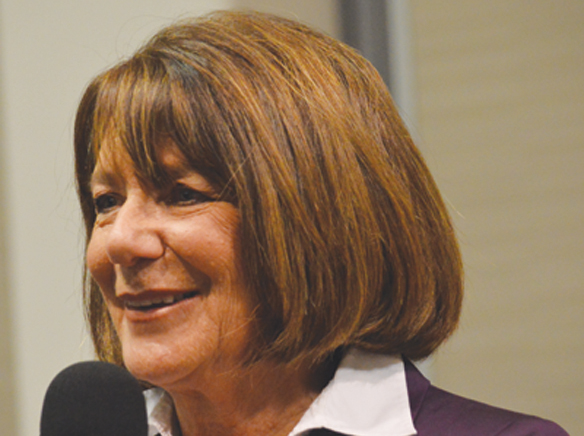Congresswoman Susan Davis, 53rd District, held a Neighborhood Day at Grossmont College on Monday, Oct. 21. Before going into open questions, Davis touched base on the situation in Washington. She said hoped the members of Congress had learned (or hoped they learned) a valuable lesson in that the shutdown cost the American economy nearly $24 billion.
“That is something that we don’t want to see again,” she said. “Largely, because it didn’t accomplish anything.”
Congresswoman Susan Davis, 53rd District, held a Neighborhood Day at Grossmont College on Monday, Oct. 21. Before going into open questions, Davis touched base on the situation in Washington. She said hoped the members of Congress had learned (or hoped they learned) a valuable lesson in that the shutdown cost the American economy nearly $24 billion.
“That is something that we don’t want to see again,” she said. “Largely, because it didn’t accomplish anything.”
She said these tactics do not work and anyone can hold any issue hostage, but what would happen if it were done all the time. She said you take an issue and the government hostage, it is not a good place to be. There is still a lot to accomplish back in Washington, she said and she is optimistic that it will not be a “redo” with the new Jan. 15 deadline.
When it came to open question, most questions and comments were concerns over the national debt ceiling, small businesses being “squeezed and bullied” out of federal contracts, the introduction, implementation and concern over the Health Initiative Act, and reduction of debt.
Davis pointed out that in reducing debt, you still have to factor the programs that help increase the economy, educate the next generation, protect seniors, and give small businesses the tools needed to succeed.
“It’s kind of a balance,” she said. “In order to grow the economy you have to have confidence in it.”
She said under this administration it has already cut $7 trillion through the Budget Control act and the across the board cuts through Sequestration, but that was just a start. But, she said, they were not all smart cuts and much more work needed to be done.
“We have to get through some of the small issues first,” she said. “Once that is done, the larger issues that we talked about, I believe there will be some consensus.”
Davis directed several questions regarding personal issues with businesses and people to get with her staff and set up a meeting with her so that they can work on particular issue together. She said most people think that they cannot get an appointment with her, and many times, they come to her office in last minute desperation. Davis said anyone could call her office that wants to talk to her about an issue and get an appointment.














